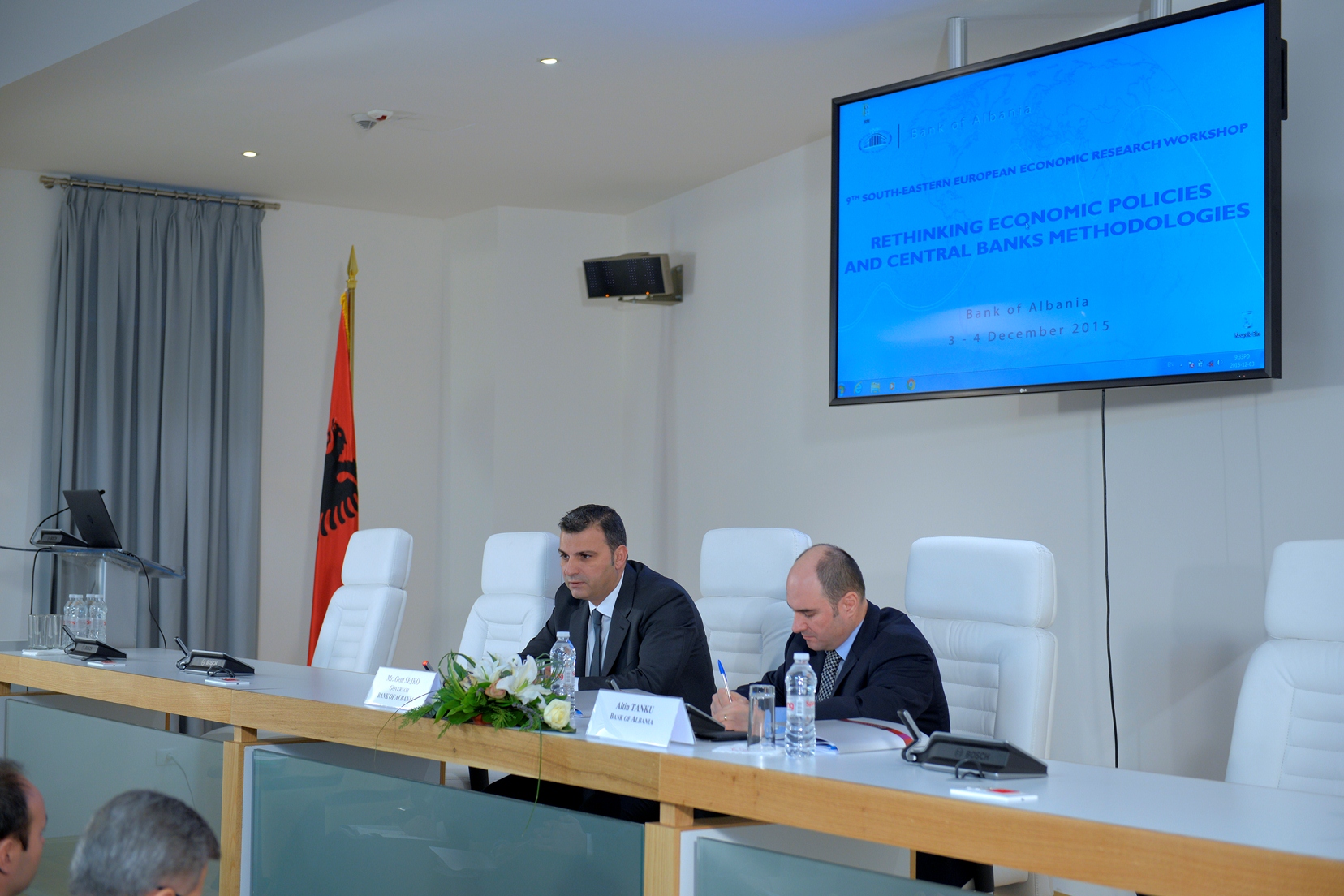BANK OF ALBANIA
PRESS RELEASE
Speech by Governor Sejko at the 9th Workshop of Economic Research in Southeastern Europe ''Rethinking Economic Policies and Central Banks' Methodologies''
Publication date: 04.12.2015
Distinguished guests, Workshop participants, Ladies and Gentlemen
I consider it a privilege to address you all for the opening of the 9th South Eastern European Economic Workshop, here in Tirana. In line with the tradition of this event, we once again attempt to complement the need for research with the need for policy novelties. Please allow me to say that judging from the contributions and the presence in this workshop, I am confident that this event will fulfill its commitments and expectations and provide all of us with useful and practical lessons.
It is important to emphasize the global and national economic background in which this event takes place and these are very difficult times. The global recession remains present. The European core was shaken not only by events in Greece, but also in Spain, Portugal and Italy, and remains fragile. The recent developments from the Middle East will add to hardships and overstretch available resources. Therefore, economic activity might take a longer time to return to its previous glorious days. Despite the fact that our region has managed to remain on the positive side of economic growth, the hardships were quick to reach us as well. Economic and income growth is not what it used to be and inflation continues to break new low records.
Central banking has received its share of challenges and hardships as well. Continuous standard monetary policy easing was coupled with micro and macroprudential policy interventions. Even interventions like quantitative-easing in the euro area were brought into attention and implemented, but still the general economy seems slow to react properly.
Furthermore, the issue is not about monetary policy alone. The non-standard interventions (micro and macroprudential policies) require special attention and resource allocation in order to properly manage their implementation and impact on the general economy. Additionally, maintaining financial stability requires additional central bank to prevent possible negative spillovers from the financial sector toward other areas of the economy.
In short, the general economic difficulties have placed central banking at a cross-road in relation to its principles, policies and management. Moreover, even though the requirement to maintain price stability remains appealing, dangers do not occur only from inflation. Exchange rate fluctuations have provided additional hazards, particularly within economies where foreign currency transactions dominate.
Additionally, financial stability challenges are present even at higher levels. Credit demand reaction to continuous monetary policy stimulus has been sluggish, reflecting the poor expectations of consumers and enterprises on future developments. Supplementary easing of the general requirements for obtaining credits did not have the expected impact and that can be observed in the recent dynamics of aggregate demand components. Unquestionably, financial agents are into profit making and it is their duty to search and find alternative clients if the traditional end-users are unwilling or uncommitted to new credit. Besides that, the need for financing will stimulate end-users to search and find alternative sources. This raises the question at more strategic levels associated with credit efficiency allocation and informality.
Allocation deficiencies tend to intensify in times of crises reflecting usually a condition of over-lending in certain sectors, which are most probably with poor spillover effects on the rest of the economy. In the meantime, the sectors that are truly productive might remain detached from financial sources, thus with little stimulus to move forward. Even worse, these sectors might address to informal lenders to compensate for their financial needs. This is also an activity that booms in times of crisis and, since these activities are entirely unmonitored by financial regulators, they could dangerously harm and diminish the ability of financial regulators to influence the economy at large.
Having mentioned all these arguments, I would like to return to our event and emphasize how the challenges mentioned above are translated into challenges for central banking research. I am most glad that all issues have been addressed at the different panels of this workshop. Additionally, although we are yet to hear them, I am most confident that the policy implications suggested in these contributions are relevant and important. The question remains: are they practical and can they be easily adapted?
This question involves the major challenge for research both at this workshop, and in general. It is your duty to provide a balance between the academic properties of research and its practical endeavors. The academic properties will guarantee a standard of research enriched with methodological novelties and points of view. Furthermore, the practical patterns would allow policy makers to fully and easily implement your policy proposals making them relevant.
This is the main expectation that I have from this event and I am confident it will be fulfilled at the end of these two days.
Without further ado, I would like to give a warmly welcome and congratulate you all for your good work and for being here today.
Thank you.


 Twitter
Twitter
 Youtube
Youtube
 Facebook
Facebook
 Flickr
Flickr
 RSS
RSS
 Subscribe
Subscribe
 Feedback
Feedback